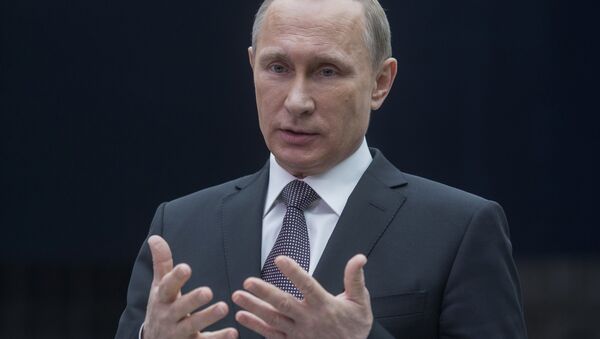LONDON (Sputnik), Daria Chernyshova — UK Independence Party (UKIP) home affairs spokeswoman Diane James stands by her admiration for Russian President Vladimir Putin's contribution to Russia in an interview to Sputnik:
"I admire Putin. I don't like him, but I admire him for what he has done for Russia, and in terms of the leadership he shows for the Russian people."
In April 2015, the UKIP official said in an interview with LBC Radio that she admired Putin "from the point of view that he is standing up for his country."
James' statement caused a media storm.
Explaining her remarks to Sputnik, the spokeswoman said many agree that "we may not like Putin, but we do admire him in terms of what he has achieved for Russia, what he has achieved for gas, the whole gas industry."
"He set an objective, he has delivered it, he is popular with his people. Yes, he has his problems, so have lots of political leaders around the world," James said.
Favorable opinions of the Russian leader spark controversy in the West, which has imposed a series of sanctions against the country over the last year on accusations of interfering in Ukraine's internal conflict.
Relations between Russia and the United Kingdom have a cyclical nature of ups and downs, a UK member of the European Parliament told Sputnik, expressing hope for better ties:
"I would love to see an improvement, and let's call it a rapprochement."
James, a UK Independence Party (UKIP) home affairs spokeswoman, said phases of cooling and warming in relations between Moscow and London are due to "very very poor foreign affairs policy, probably on both sides."
"We seem to go in cycles with Russia, we seem to be allies to some degree, not necessary friends, but allies," she said, citing World War II, counter-terrorism efforts, and other global security issues.
James also noted that Russia and the United Kingdom mistrust one another, but urged the sides to stop a tit-for-tat foreign affairs policy.
Diplomatic ties between Moscow and the West have suffered considerably in 2014 in the wake of Crimea's reunification with Russia in March and the Ukrainian conflict the following month.
Behind accusations of Russia's interference in Ukraine's internal affairs, the United States, the European Union and other countries handed down a series of restrictive measures aimed at Russia's energy, banking and defense sectors.
Moscow denies its involvement in the military confrontation between government forces and southeast Ukrainian independence supporters, criticizing the Western sanctions regime as counter-productive.

